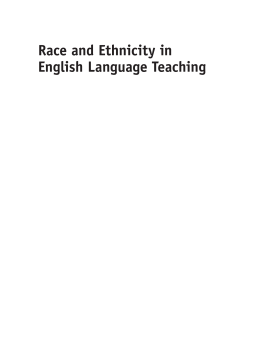
Additional Information
Book Details
Abstract
This book examines racism and racialized discourses in the ELT profession in South Korea. The book is informed by a number of different critical approaches to race and discourse, and the discussions contained in the chapters offer one way of exploring how the ELT profession can be understood from such perspectives. Observations made are based on the understanding that racism should not be viewed as individual acts of discrimination, but rather as a system of social structures. While the book is principally concerned with language teaching and learning in South Korea, the findings are situated in a wider discussion of race and ethnicity in the global ELT profession. The book makes the following argument: White normativity is an ideological commitment and a form of racialized discourse that comes from the social actions of those involved in the ELT profession; this normative model or ideal standard constructs a system of racial discrimination that is founded on White privilege, saviorism and neoliberalism. Drawing on a wide range of data sources, this book is a must-read for anyone interested in critically examining ELT.
Using South Korea as a case study, this book explores key questions about race and hegemonic discourses in ELT that impact teachers, teacher educators, researchers, material developers, administrators, students, and policy makers around the world. This book forces us to unearth and question the axioms that our field is built on and, by doing so, create the possibility of making our profession more equitable and free of discrimination.
Christopher Jenks perceptively draws from his personal experience as a biracial professional in diverse communities in the East and West to “color” the field of English language teaching, in order to expose invisible and unspoken racial inequalities and unleash the creative potential of diversity in language learning and communication.
Christopher Joseph Jenks works at the University of South Dakota. He specializes in the political and cultural implications of the global spread of English. His research interests include multiculturalism, critical race theory, translingualism, postcolonialism, neoliberalism and national identities. His eight published and forthcoming books cover a range of topics, including chat room interaction, intercultural communication and second language acquisition.
This refreshing critique of racialized discourses in the English language teaching profession in South Korea takes the debates about White normativity and privilege and neoliberialism to a new level. It is empirically rich and theoretically sharp. It is a key reference in the growing body of critical literature on race, ethnicity and equity in education and society.
Table of Contents
| Section Title | Page | Action | Price |
|---|---|---|---|
| Contents | v | ||
| Series Editors’ Preface | vii | ||
| 1 Introduction: Overview and Objectives | 1 | ||
| 2 Critical Approaches to Race | 31 | ||
| 3 Korea in Context | 71 | ||
| 4 White Normativity in ELT | 84 | ||
| 5 White Saviorism in ELT | 105 | ||
| 6 White Neoliberalism in ELT | 119 | ||
| 7 Beyond Korea: Racial Capitalism and White Public Spaces | 133 | ||
| 8 Conclusion and Future Directions | 149 | ||
| References | 164 | ||
| Index | 181 |
